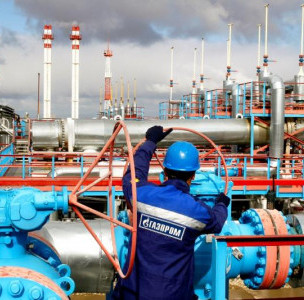Top stories from the Russian press on Friday, May 20th, prepared by TASS
Izvestia: Switzerland, Austria putting their neutrality to the test
In light of the Ukraine developments, Switzerland will put together a plan by the fall to beef up security cooperation with NATO and the EU, the country's defense department told Izvestia. The Swiss parliament also said that, despite the lack of intentions to join the alliance, the debate on rethinking the neutral status is gaining momentum in the country. In Austria, meanwhile, the defense budget is being increased. However, according to experts interviewed by Izvestia, these countries will still not give up their neutral status - they simply have no problems with protecting their borders.
The Swiss Federal Department of Defence, Civil Protection and Sport (DDPS) told Izvestia that the country's Federal Council plans to strengthen cooperation with NATO in security policy.
Member of the National Council of Switzerland and President of the Green Liberal Party Jurg Grossen explained to Izvestia that his party intends to initiate a broad discussion about neutrality. The population is rethinking the concept of neutrality and the role of Switzerland in the world, he added.
Meanwhile, in Austria, another neutral country in Europe, scientists, writers and former politicians are trying to push the government into an extensive discussion about the nation’s status. However, member of the National Council of Austria from the Social Democratic Party (SDPA) Petra Bayr told Izvestia, Vienna not only doesn’t plan to join NATO, but, unlike Switzerland, it is not even thinking about bolstering cooperation with the alliance.
Head of the Department of Social and Political Research at the Institute of Europe of the Russian Academy of Sciences Vladimir Schweitzer told the newspaper that the main reason the Austrian and Swiss stances is the absence of an immediate threat to their borders.
"The Scandinavian countries, which have now expressed their desire to join NATO, believe that they have reason to fear for their borders. Austria and Switzerland do not border Russia, unlike Finland. Owing to the absence of border protection issues, they will definitely not give up their neutral status," the expert added.
Kommersant: West, Russia put forward Ukraine reconstruction plans
The US and EU continue to increase financial support for Ukraine, both to meet its operational needs and as part of long-term programs aimed at the country's full-scale reconstruction. The US Senate on Thursday passed a $40 bln financial aid package to Kiev. In addition, the G7 announced it was going to provide $18.4 bln in assistance. For its part, Russia is also going to improve life in the territories under its control, Kommersant writes. Meanwhile, negotiations between the countries are stuck in the mud.
To implement its long-term plan to support Ukraine, the European Commission proposed to create an international "Ukraine Recovery Platform", which will be led by the EC and the government of Ukraine. The creation of the RebuildUkraine fund within the framework of the EU budget is also planned.
Earlier, President of Ukraine Vladimir Zelensky also spoke about the need for reparations from Russia. However, for its part, Russia is also going to rebuild Ukraine, however, only "liberated territories". How much money Russia plans to allocate for the recovery is still unknown. Russian Deputy Prime Minister Marat Khusnullin told reporters earlier, "all decisions that we will restore and finance it have been made."
Meanwhile, the Kremlin and the Russian Foreign Ministry have stated that Kiev has no intention of continuing negotiations. In this context, Italy’s proposals to end the standoff between Russia and Ukraine were made public on Thursday. According to the newspaper La Repubblica, the plan had been submitted to the UN Secretary General and had already been seen by the G7. There are four main points: a ceasefire and the elimination of the line of hostilities under UN supervision, Ukraine's entry into the European Union and neutral status without joining NATO, an agreement between the two countries on the "disputed territories" of Donbass and Crimea, and a new multilateral peace treaty and European security.
Vedomosti: What awaits McDonald's enterprises in Russia
On May 19, McDonald's announced the sale of its business in Russia to its franchisee partner, businessman Alexander Govor. He will develop it under a new brand, the company said. The Ministry of Industry and Trade expects that the deal will keep jobs while guaranteeing obligations to employees. According to experts interviewed by Vedomosti, the new restaurant chain might face difficulties.
The deal’s price tag between Govor and McDonald's was not disclosed. Before the start of the special operation, the fast-food multinational’s Russian business was worth at least $1 bln, Mikhail Burmistrov, CEO of Infoline Analytics, believes. According to him, now, taking into account a current discount on Russian assets, the company's losses from the extended downtime, and the lack of a brand and changes in the recipe and menu, it can be estimated at around 35 bln rubles ($564.23 mln).
Restaurants can reopen in mid-June retaining staff, outlets and menus. The new brand was not yet revealed, but according to experts the new restaurant chain legally cannot use anything close to the current McDonald's branding in colors or names.
Russian McDonald's may also lose a number of venues. Part of the contracts with shopping centers is tied to a trademark - landlords saw McDonald's as an anchor tenant, and in case of changes, they can unilaterally terminate the contract and collect a huge fine, Ombudsman for the restaurant business in Moscow and the Moscow Region Sergey Mironov suggests.
According to him, the buyer of this business is also very limited in maneuvers if he wants to stay in the lower price segment and maintain quality. If the new chain tries to move to a higher price segment, it risks losing 30% or more of consumers.
Nezavisimaya Gazeta: Washington preparing ‘last resort’ sanctions against Russia
US Congress has embarked on combating terrorism in a whole new way through new legislation. On Wednesday, the House of Representatives passed a bill aimed at preventing domestic terrorism. This raises the odds that Congressional anti-terrorist commitments will also affect Russia, Nezavisimaya Gazeta writes. There are now draft resolutions in both houses of Congress calling for declaring Russia a sponsor of terrorism.
Draft resolutions on recognizing Russia as a country sponsoring terrorism were submitted to the House of Representatives and the Senate last week. Both proposals are bipartisan, which bolsters the chances that they will be passed. These are virtually the same resolutions, the newspaper writes. They introduce a large number of difficult-to-repeal and more than serious sanctions against Russia. For example, representatives of a country recognized as a sponsor of terrorism may be stripped of their diplomatic status, US citizens are prohibited from conducting financial transactions with its state institutions without a special license, and it will not be possible to provide economic assistance to it. This could also entail the seizure of Russian property abroad.
Senior Research Fellow at the Institute for US and Canadian Studies at the Russian Academy of Sciences Vladimir Vasiliev called the resolutions ‘last report sanctions’, in the sense that their adoption increases the likelihood of a direct military conflict between the United States and Russia. And for this reason, the expert does not expect that these documents will be adopted, at least not quickly. "Maybe the United States will use them as a threat, a reminder that not all sanctions weapons have yet been used," he told Nezavisimaya Gazeta.
In his opinion, everything will depend on how the situation around the Russian special operation develops. "If it is a stalemate, like now, adopting these resolutions does not make sense. The same applies to the situation if Ukraine wins. But if Russia wins, then, in order to taint the effect of this victory, these resolutions can be adopted," he believes.
Vedomosti: Novatek wraps up construction of first Arctic LNG-2 line
Novatek is keeping the planned commissioning deadlines for the Arctic LNG-2 project in the face of anti-Russian sanctions, according to co-owner of the company and Chairman of the Board Leonid Mikhelson. He also clarified that the localization of equipment in the next two or three years will reach 70-80%. Thus, the company also maintained the target indicators for the share of domestic equipment, which were announced by Mikhelson back in 2019, Vedomosti writes.
Meanwhile, experts interviewed by the newspaper believe that Novatek will be able to meet the planned project deadlines even in the face of severe restrictions on the supply of equipment from Europe and the United States. Nevertheless, the figure of 70-80% for equipment localization is seen as an overestimate.
The most difficult thing is to localize the production of gas turbines, CEO of Infoline-analytics Mikhail Burmistrov told the newspaper. Imported turbines from the [US] Baker Hughes are used under a contract with the Italy’s Nuovo Pignone for Arctic LNG-2, he specified. In addition, there are difficulties with compressors and cryogenic heat exchangers.
Novatek could fulfill the plan for localizing equipment for Arctic LNG-2 by 70-80%, analyst at the National Energy Security Fund Igor Yushkov believes. But, in his opinion, it would be necessary to take into account not only equipment for liquefying gas, but also equipment for its production. Chinese companies can become an alternative supplier of LNG plants, he said.









